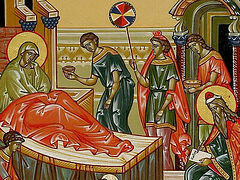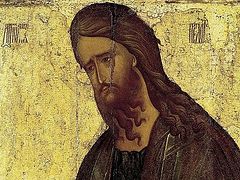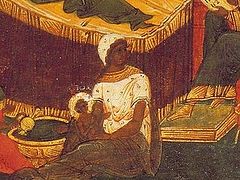He was born to yield to Another. And we can hardly understand this. To decrease ourselves in order to exalt another—there it is, the mystery of sanctity.
His life was a complete puzzle. How was he filled with the Holy Spirit from his mother’s womb (cf. Lk. 1:5), when the Spirit had not yet descended to people? How did he as a small boy live in the desert? For it is said: And the child grew, and waxed strong in spirit, and was in the deserts till the day of his shewing unto Israel (Lk. 1:80). How was this possible?
And another paradox: He did not follow after the Savior. In general, he didn’t follow anyone. Even when both he and the Savior were in their mothers’ wombs, it was the Mother of Christ who went to the mother of the Baptist; and the latter greeted the Divine Infant from the tender cradle of his mother’s womb with joyful leaping. This was as if a prelude to Christ’s future appearance to the people, when the Savior would meet the Baptist.
***
But nevertheless, John seems to us to be somehow deprived. He did not hear Christ’s teachings, especially the mellifluous Beatitudes and the Sermon on the Mount, to which those present listened with beating hearts. He did not see the Savior’s wondrous miracles, did not behold His inexplicable Transfiguration, and did not participate in the Last Supper. Moreover, we find in the Gospel a “terrible” testimony: John did no miracle (Jn. 10:41); that is, he didn’t perform a single miracle throughout his whole life. But just the same it is amazing that the Savior said, Among them that are born of women there hath not risen a greater than John the Baptist (Mt. 11:11). And this means that righteousness is not measured by miracles.
We can also say that from the beginning, from Herod’s barbaric persecution against the infants, he was doomed. When Rachael lamented her children (cf. Mt. 2:18), and Herod’s soldiers greedily prowled everywhere after the innocent children—from that time on John was consigned to suffering. Whether he found refuge with the Essene community (as some suppose) or was simply protected by God’s Providence alone, it was amidst those scorched craigs that say with their whole appearance to man, “this is no place for you”, where shadows disappear at noon and all life stands still—there is where he found his saving refuge.
Eating wild honey and mysterious locusts, about which scholars still argue, he grew in an incomprehensible way to be the spiritual man that we find before us in the Gospel.
***
The word of God came unto John the son of Zacharias in the wilderness (Lk. 3:2), we usually read in the Gospel. “The word of God”—this is how in the Bible the prophetic calling is indicated. For example, Now the word of the Lord came unto Jonah the son of Amittai, saying, Arise, go to Nineveh, that great city, and cry against it; for their wickedness is come up before me (Jonah 1:1–2). But Jonah was frightened and tried to run away. Or, for example, Jeremiah says of himself, Then the word of the Lord came unto me, saying, Before I formed thee in the belly I knew thee; and before thou camest forth out of the womb I sanctified thee, and I ordained thee a prophet unto the nations (Jer. 1:4–5). But Jeremiah doubted: Then said I, Ah, Lord God! behold, I cannot speak: for I am a child (Jer. 1:6). And the Lord instructs him: Say not, I am a child: for thou shalt go to all that I shall send thee, and whatsoever I command thee thou shalt speak (Jer. 1:7). Even Moses wavered before his calling: O my Lord, I am not eloquent… but I am slow of speech, and of a slow tongue (Ex. 4:10). And the Lord instructed him: Who hath made man’s mouth? or who maketh the dumb, or deaf, or the seeing, or the blind? have not I the Lord? (Ex. 4:11).
John did not doubt and did not run away. He unflinchingly responded. Perhaps that is why it is said of him, Among those that are born of women there is not a greater prophet than John the Baptist (Lk. 7:28). His response was lightning-fast, like the angels who fulfill God’s will are lightning-fast. Therefore, John himself was called an angel; that is, a herald of God’s will: Behold, I send my messenger before thy face, which shall prepare thy way before thee (Mk. 1:2; cf. Mal. 3:1).
Here is yet another striking thing. Isaiah, who foresaw the uniqueness of the Forerunner’s service, prophesied: The voice of him that crieth in the wilderness, Prepare ye the way of the Lord (Is. 40:3). But who will hear you in the wilderness? If you want to be heard, go to the city squares, to the village streets. Go where people are milling about here and there like ants. The paradox of John is that he preaches in the desert, and people come to him in that desert.
Without going out to people in the world, John drew people from the world. And the desert itself in which he preached drew them away from their everyday vanity, from their rushing and running; and there a person would begin to think about how he will appear before God. Then went out to him Jerusalem, and all Judaea, and all the region round about Jordan (Mt. 3:5).
And here is another important characteristic: His word is stern and tough. He spoke sharply, abruptly, threateningly, not having no consideration for anyone’s status, lineage, or place in society. Generation of vipers (Mt. 3:7), he said; that is little snakes, trivial, poisonous creatures—Who hath warned you to flee from the wrath to come?... And now also the axe is laid unto the root of the trees, therefore every tree which bringeth not forth good fruit is hewn down, and cast into the fire (Mt. 3:7–10).
He flogged with stern words, and people listened. His preaching, rough like his hair shirt, penetrated people’s souls. And if we were to find ourselves next to him at that moment, our spines would freeze and our knees would buckle from John’s stern, irreproachable sanctity and his rough reproach of our vicious spinelessness. We would completely lose our composure from his forceful, clairvoyant and penetrating gaze, and we would not say a word.
***
It is also a paradox that his sternness drew people to him. Instead of searching for mellifluous speeches, instead of the consolation that we so long for, people went to him, a stern rebuker. And he went on: He that cometh after me is mightier than I, whose shoes I am not worthy to bear: he shall baptize you with the Holy Ghost, and with fire: Whose fan is in his hand, and he will throughly purge his floor, and gather his wheat into the garner; but he will burn up the chaff with unquenchable fire (Mt. 3:11–12).
He is not an orator, or a preacher in the familiar sense; he “scorched people’s hearts with his words.” And for his every word, which he confirmed by his own manner of life, one could feel a lofty, other-worldly truth. That is why people came to him. They were silent, they lowered their heads in shame, turned red, and suffered—but always went. For the soul longs for truth, bitter as it may be, like that wild honey that John ate in the desert.
Yes, his words did not soften hearts—they broke them. As a hammer breaks a tough shell, and the living heart then feels it. Or like an electric shock brings one out of deep sleep, so did the Forerunner’s words penetrate and awaken, beat and brake. That is why people repented before God and desperately immersed themselves in the waters of the Jordan for the sake of a new and pure life. But St. John the Forerunner’s toughness was not cruelty. Of course, it was the kind of firmness and sternness that made people uncomfortable. His truth, confirmed by his manner of life, slices through spineless and negligent characters like a scythe. Legionnaires who were fearless in their battles with wild barbarians lost their confidence before him and humbly asked, And what shall we do? (Lk. 3:14). Cunning tax collectors meekly agreed not to take more than their due (cf. Lk. 3:12–13). Herod Antipas himself, although he would soon lock up the Forerunner in prison, feared John, knowing that he was a just man and an holy, and observed him; and when he heard him, he did many things, and heard him gladly (Mk. 6:20).
People related to each other with reverent fear John’s words about the Christ Who would come after him and about the coming Judgement. Since John said it, since such a man of integrity and steadfastness, as people would say now, such an unbending leader testifies to what is coming, then it must be so. People always look for a leader. And you’ll rarely find among the mass of false prophets, deceivers, and self-confident manipulators that abounded throughout our history a genuine adamant. John was just such a godly adamant.
***
And thus, sanctity is not necessary gentleness. Where oil calms and puts one to sleep, fire awakens and makes one act. Peter felt sorry for the Savior in the human sense, and said, Be it far from thee, Lord: this shall not be unto thee (Mt. 16:22)—meaning His coming torments. And we know how the Lord answered him, we know what He called Peter for such softness. But when John had only just seen Christ, he directly testified: Behold the lamb of God, Who taketh away the sins of the world (Jn. 1:29). That is, the Lamb-Christ, innocent and pure, condemned to the slaughter, in the image of the Old Testament sacrificial lambs.
With this phrase John as if enters into the conversation between the ancient forefather and patriarch Abraham and his son Isaac. Trustingly following his father to the mountain of Moriah, Isaac asked his meek parent: Where is the lamb for the whole burnt offering? (Gen. 22:7). Abraham, who boundlessly loved his son but trusted more in the Heavenly father, answered, God will provide the lamb (Gen. 22:8). And truly, it is not Isaac who asked to be brought as a sacrifice; for it is not him who was prepared for the sins of the whole world. John saw God’s mystery. And looking upon Jesus as He walked, he said, Behold the Lamb of God (Jn. 1:36). The sacrifice—the incarnate Son of God, who became the Son of Man for our sakes. The future apostles were still catching fish when John already saw into this sacred mystery.
In this is the meaning of John the Baptist—a seer of mysteries. And the New Testament mystery of the Trinity—the voice of God the Father, the illumination of the Son baptized in the Jordan, the vision of the Holy Spirit in the form of the dove—is revealed precisely to him. He sees into the mysteries of New Testament revelation. The Trinity and Christ’s sacrifice on the Cross are at the center of St. John the Baptist’s testimony.
***
And thus, the bare, righteous sternness of John produced a miracle: People came to him. But he did not preach about himself. I baptize with water: but there standeth one among you, whom ye know not; He it is, who coming after me is preferred before me, whose shoe’s latchet I am not worthy to unloose (Jn. 1:26–27). John broke the hearts of others by his firm words, but his own soul softened and filled with compunction when he spoke about the Savior. “I am not worthy to bear His shoes” (cf. Mt. 3:11). Tenderness showed itself precisely in his words about Christ.
He recognized Christ immediately. As soon as the Savior appeared in the crowd of gathered sinners, the stricken John saw Him right away—the One Who needs no repentance. “How could this be—He too has come to be baptized, standing next to obvious sinners, as if taking their lot upon Himself?” John might have thought. The humble Christ broke John’s own heart: I have need to be baptized of Thee and Thou comest to me? (Mt. 3:14).
He rejoiced in Christ while yet in his blessed mother’s womb. He leapt for joy when he met the Divine Infant while He Himself abided in the bosom of the Most Pure Virgin. Now his soul has found genuine peace—he has met Him Who is to come and Who has come; He has revealed His peace.
The fearsome and strict ascetic, the tough rebuker of the sins of this world, John yields to the Meek and Humble One, that He might heal fallen souls with love and longsuffering. The spirit of zeal for the God of Righteousness, as if as an expression of the Old Testament, is replaced by the Spirit of sacrificial Love. There it is, the righteousness of the New Testament.
Without yielding to anyone in his principles, not even to King Herod, John joyfully yields to the Savior. As for his personal “I”, his authority before the face of the people and his closest disciples, John also easily yields all this to Him Who has come. He tries to explain it to His disciples: I am not the Christ, but I am sent before Him. Ye yourselves bear me witness, that I said, I am not the Christ, but that I am sent before him. He that hath the bride is the bridegroom: but the friend of the bridegroom, which standeth and heareth him, rejoiceth greatly because of the bridegroom's voice: this my joy therefore is fulfilled. He must increase, but I must decrease (Jn. 3:28–30). There it is, that paradoxical, incomprehensible peace of the truth—to decrease oneself in order to exalt Another. And in this is true greatness. Even the apostles argued about which of them is greater in the Kingdom of Heaven. The Forerunner did not argue or make any claims. He rejoiced with a joy that we are unable to understand. He literally shone with joy when the Other waxed greater, and he himself decreased. And in this, I repeat, we will probably never understand him. For we are accustomed from childhood to soft raiment and good living, everywhere affirming our own “I”. How could such people understand John?
***
His humility is astounding. He baptized others, he asked the Lord for baptism, but he was not vouchsafed this baptism. He was seized too early, and accepted a death that was due to the whispering of a deceitful woman. Having just barely baptized the Savior, even before the Lord chose His twelve disciples, John was already imprisoned. He was filled with the Holy Spirit from His mother’s womb (cf. Lk. 1:15), and signed by this his own death sentence. He was led by another Spirit, and the world could never live in peace with him.
And then he was executed—in an ordinary and banal way, simply because someone danced too masterfully, and another who had drunk too much made a thoughtless oath. And immediately the king sent an executioner, and commanded his head to be brought: and he went and beheaded him in the prison, and brought his head in a charger, and gave it to the damsel: and the damsel gave it to her mother (Mk. 6:27–28). That is how the evil world deals with people who are alien to the world. And that is basically it, if we speak of earthly reality. But if reality is drawn not only from the earthly, then no, that is not all. For John, baptized in his own blood, became the Forerunner even in hell, foretelling the destruction of hell. When He Who descended into hell, the Same Who ascended before all to the heavens (cf. Eph. 4:10), opened the doors of inexpressible Paradise, then John is also together there with Him Whose head he touched in the Jordan.
His name, inscribed on the tablet by his dumb father, is known to all. Revealed by the angel even before his birth, it was given to him as to the angels. He preached the coming of the Kingdom of God, because he himself stood at the threshold of this Kingdom. Now he is the Protector in the Kingdom of Heaven of all those who repent.
Three icons comprise the core of our iconostasis. In the center, of course, is the image of the Savior—the Merciful Pantocrator, Whose name is Love. On His right hand is the Mother of God, the pure Intercessor for all the suffering. At His left hand is St. John the Forerunner, faithful to Christ to the end, to his very last drop of blood. May the Lord help us also take on this faith, compassion, and love.




